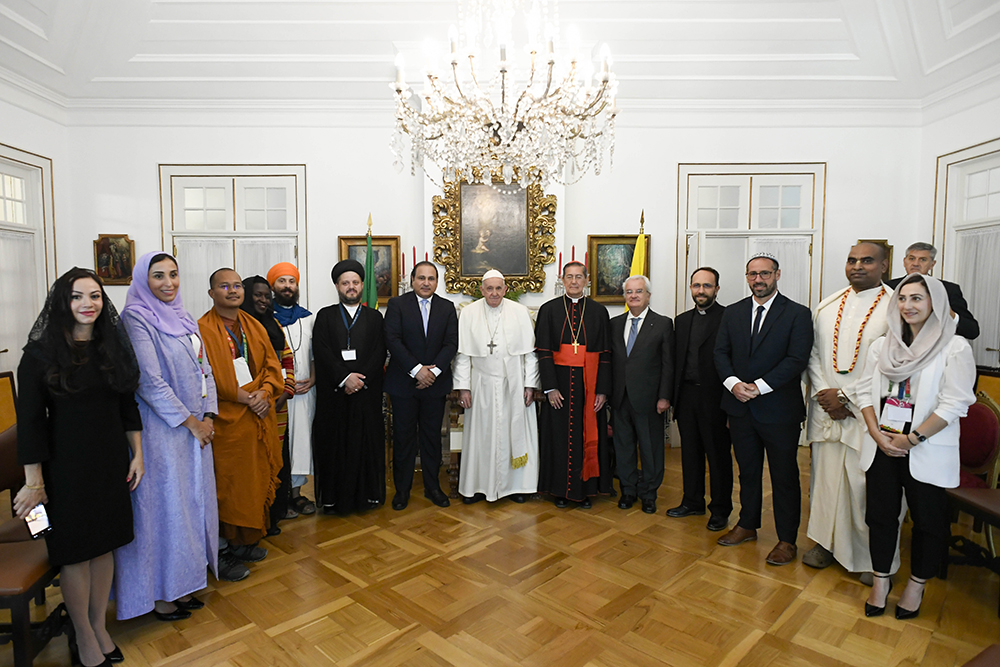
By Elise Ann Allen
LISBON (Crux) — During a meeting with interreligious leaders Aug. 4 in Lisbon, Pope Francis spoke to a Russian Orthodox bishop who voiced regret for the Ukraine war and thanked the pontiff for his repeated efforts and words on behalf of the Ukrainian people.
Portuguese Father Peter Stillwell, director of the Portuguese bishops’ Department of Ecumenical Relations and Inter-religious Dialogue, told journalists after the meeting that he was standing behind the Russian Orthodox bishop, who he said is an auxiliary bishop for the Russian Orthodox diocese of Paris, as they were in line greeting the pontiff.
This bishop gave the pope an icon of the Virgin Mary and told the pope that even though he belongs to the Russian Orthodox Patriarchate of Moscow, which has been vocally supportive of Russia’s invasion of Ukraine, “in my community we feel, very much, the horror of this Ukrainian war.”
“I would like to thank you very much for all you have done for the Ukrainian people, the bishop told Pope Francis, according to Stillwell.
The bishop also told Pope Francis that his name was Peter and he himself was moved, “because I’m now meeting with you, who are the Successor of Peter.”
Stillwell said the pope was very visibly moved by what the bishop had said and appeared to be “caught unawares by his emotions, whereas before he had been exhausted by what he had done in the morning.”
The whole encounter, he said, lasted about 30-45 seconds, before the line moved forward and Pope Francis continued greeting other religious leaders present.
Though Stillwell did not identify the bishop, presumably he was referring to Bishop Petru Pruteanu, who is responsible for the Russian Orthodox community in Portugal and Spain on behalf of the Paris-based Patriarchal Exarchate in Western Europe.
Pope Francis is currently on a formal Oct. 2-6 visit to Portugal for World Youth Day, during which he is presiding over several activities for the event, and has so far held multiple encounters not included on his formal schedule.
Earlier Friday morning, the pope met with a Portuguese woman named Maria da Conceição Brito Mendonça, who is 106 and was born on the day of the Marian apparitions at Fatima on May 13, 1917, as well as a young woman named Edna Pina Lopes Rodrigues, who suffers from what the Vatican described as “a serious illness and to whom the pope had sent a message of affection and prayer last June.”
In their statement on the interreligious meeting, the Vatican said the pope offered a brief reflection on “the value of fraternity and dialogue,” as well as the dangers of “monologue and proselytism.”
At a press conference on the meeting Friday afternoon, interreligious leaders, including an Anglican bishop, an evangelical priest, and a representative of the Hindu community in Portugal said the conversation focused largely on the need for dialogue, encounter, mutual respect and inclusion.
Stillwell in his comments to journalists said there were around 19 people in his group, and that the pope “spoke to us very easily about how it was important to realize that we were brothers in our different religious traditions.
“That was something which for him was very important,” he said, saying the pope at one point stretched out his hand and said, “our hand should be stretched out in friendship to others, and then he put his hand down and said, not in our pocket.”
The pocket, the pope said, “has to do with money, unfortunately everything in society seems to be valued in terms of exchange, but there are certain things that cannot be bought and sold.”
Stillwell said Pope Francis also stressed the importance of “keeping society open to transcendence” and to the presence of God, as well as efforts to promote human dignity and care for the poor.
The Israeli ambassador to Portugal with the rector of the University of Lisbon were also present, as they had planted six trees alongside Vatican Secretary of State Cardinal Pietro Parolin in a botanical garden representing six major religions — Taoism, Hinduism, Buddhism, Judaism, Christianity and Islam — with youth from each of the religions present.

World-building is a beautiful project. Ecumenical Relations and Inter-religious Dialogue need to foster people to people contact. – Dr. Cajetan Coelho